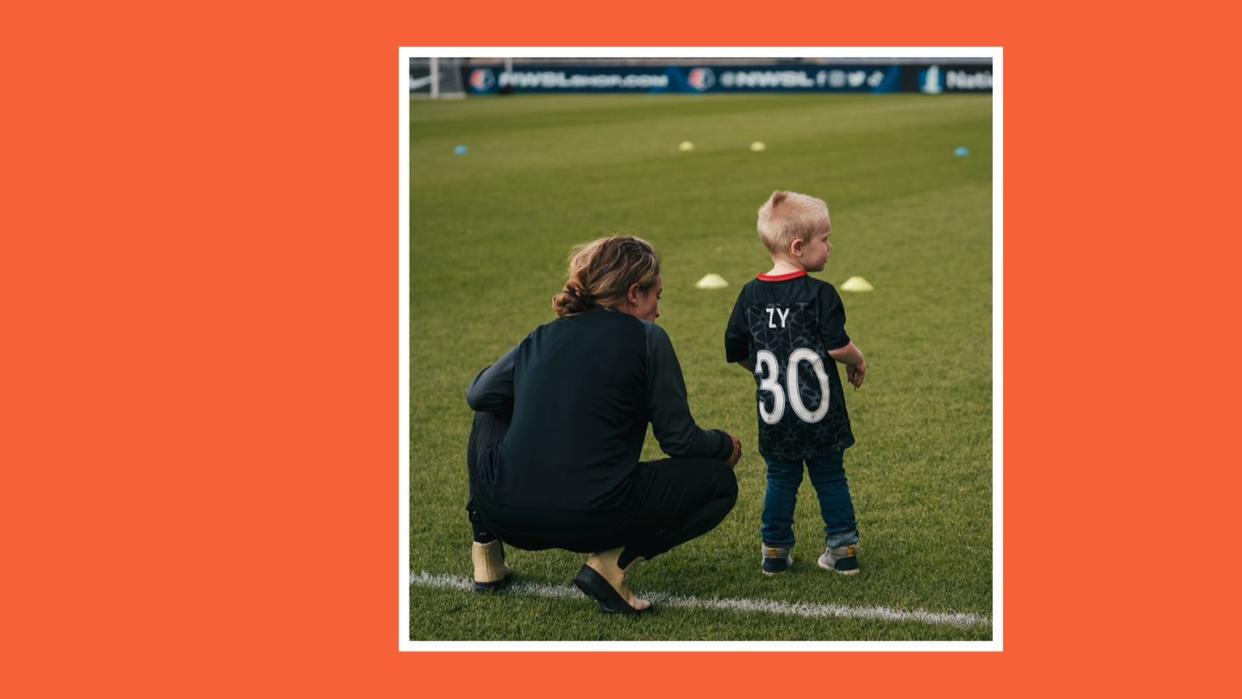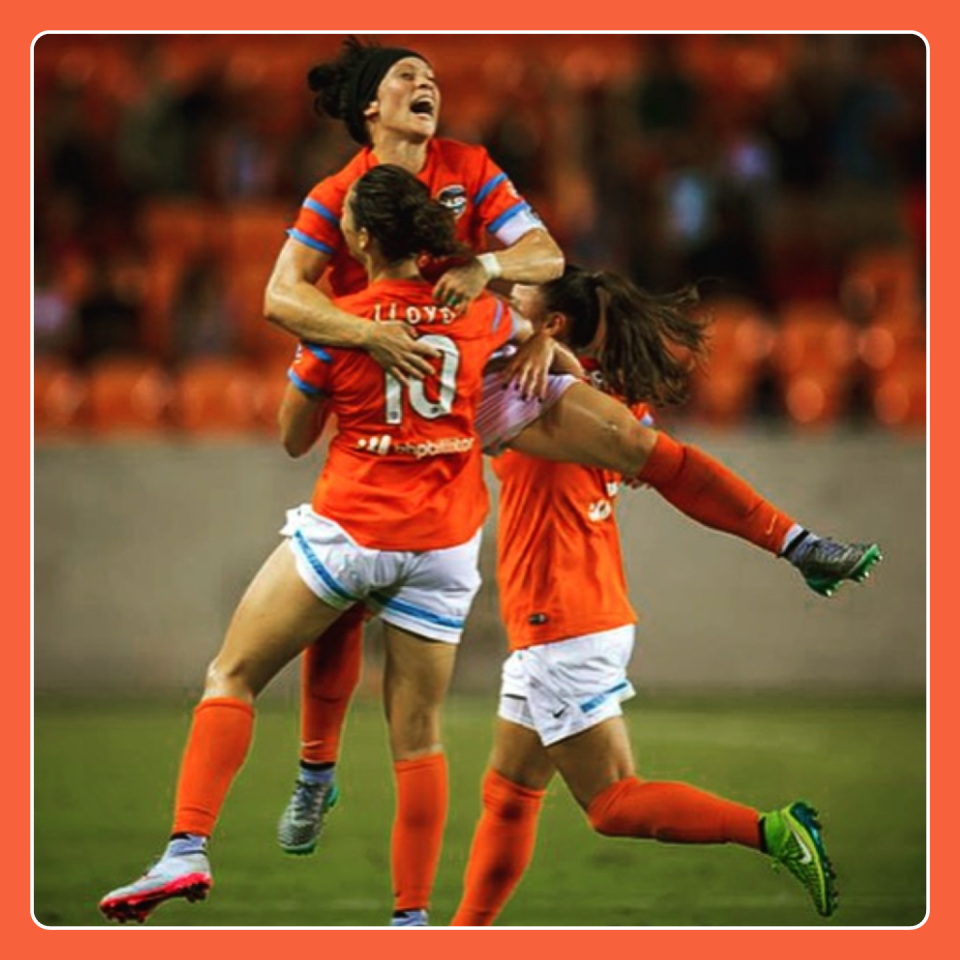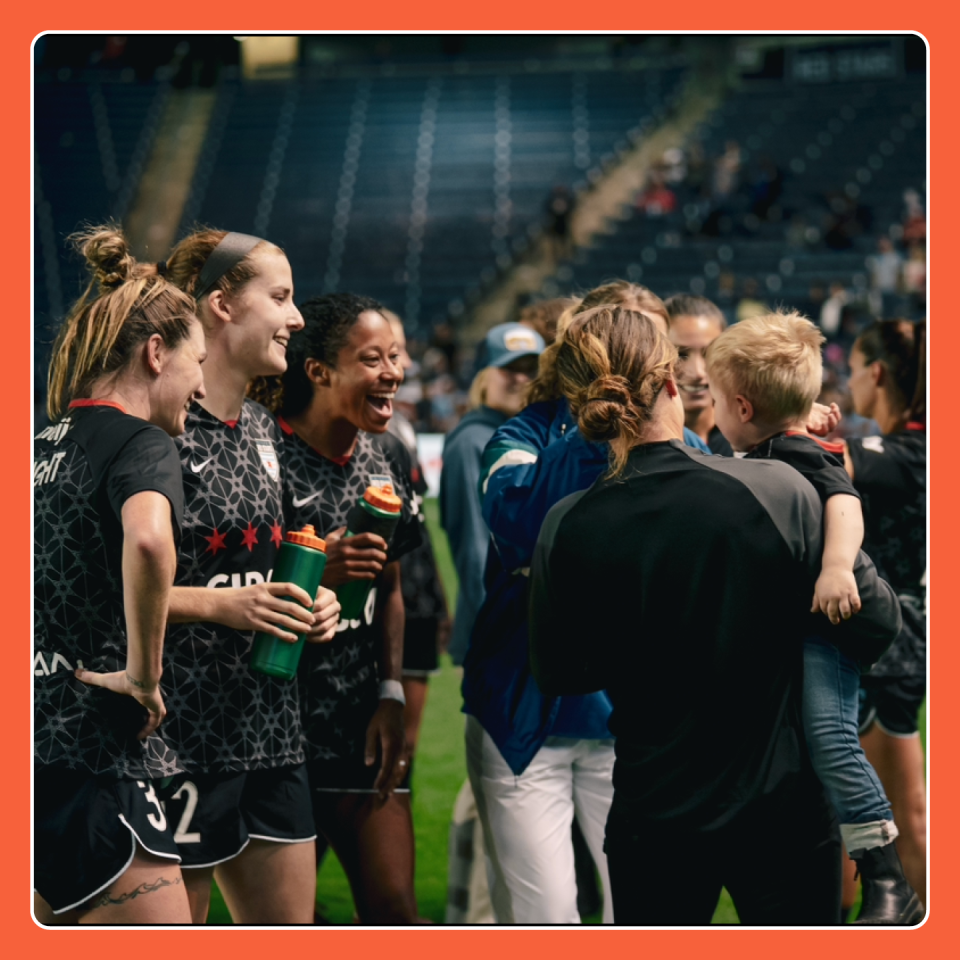'Misconduct In Women's Soccer Can't Go Under The Radar Like It Did Before'

- Oops!Something went wrong.Please try again later.
- Oops!Something went wrong.Please try again later.
"Hearst Magazines and Yahoo may earn commission or revenue on some items through these links."
Ella Masar is a former professional soccer player for the Houston Dash, Paris Saint-Germain, and the U.S. Women's National Team, among others, and a current assistant coach at the Chicago Red Stars. She's also a mom, and has been an advocate for herself and her fellow players when it comes to issues of misconduct in soccer, most notably, in her experience on the MagicJack pro team in 2011. Here, she shares her story and her take on everything happening in the world of women’s soccer right now.
I was lucky to spend the first 22 years of my life in the diverse little country town of Champaign-Urbana, Illinois. I never thought about anything outside of what happened in that town. I stayed close to home, walking on to the soccer team at the University of Illinois. After college, my soccer career took me around the world.
Now, at 37, I've lived in eight different countries and I can speak four languages. I've gone from the bench player, to the rookie, to the United States Women’s National Team player, to the superstar, to being invisible. I didn't come from much, but no one knew because I was a good athlete. No matter who you are, everybody has to put their foot behind the line. Soccer unites the world, and it's taught me the best and most challenging lessons I've ever learned in my life.
It’s an interesting time for women’s soccer. This year’s Women’s World Cup had so much hype, but in America, it feels like commitment to—and interest in—the tournament hasn’t changed much. Then, there was the completely diabolical situation (there is no other way I can describe it) where former Spanish soccer federation president Luis Rubiales non-consensually kissed player Jenni Hermoso after the team won the cup.
As a professional soccer player, I spoke out about mistreatment from my team’s owner.
In 2011, I signed with MagicJack, which was a new club in the now-defunct Women’s Professional Soccer league. Owner Dan Borislow brought in stars in the prime of their careers, like Abby Wambach and Hope Solo, for salaries much higher than the league average, and they deserved that. But I also saw women being treated in a way that they should never be treated and spoken to in a way that they never should be spoken to.

That summer, the WPS players union filed a grievance against Borislow, who died in 2014, accusing him of creating a “hostile, oppressive and intimidating work environment.” (That same year, the WPS terminated Borislow’s franchise before the grievance was resolved, issuing a two-sentence statement that did not include an exact reason for its termination.) I spoke out publicly about what I’d seen, but not everyone agreed. For me, there was no other choice—I just felt like I had to do the right thing. I can't judge anyone else’s actions, because you never know what someone is going through. And I can say that now, because I've had time to think it over and let it be.
But back then, I felt isolated. I didn't understand. It was hurtful and I was angry. It was hard. But I’ve also made mistakes in my life and had to learn from and apologize for them. So I can't judge them, and I hope that they don't judge me. It takes time.
Seeing the global support for the Spanish women’s national team is such a welcome change from what I’ve experienced.
Last September, before the 2023 Women’s World Cup, 15 of the team’s top players announced they would no longer play for their country in protest of head coach Jorge Vilda. They each wrote that the negative team culture was “having an important effect on my emotional state and by extension my health.”
If you watched Spain play, it was kind of eerie: After the games, nobody went over to Vilda. Instead, the players separated and walked away from him. It almost seems like their distaste for the system is what united them. They played for something else, which united them in a way that they had not been before.
Spain went on to win the tournament, but the victory was overshadowed by controversy when Royal Spanish Football Federation president Luis Rubiales kissed star player Jenni Hermoso on the mouth without her consent during the medal ceremony—and then refused to resign from his post as the world erupted in outrage around him. On September 6, Hermoso filed a criminal sexual assault complaint against Rubiales with the prosecutor’s office at Spain’s National Court. Rubiales initially apologized, but then said that Hermoso “initiated the exchange” and defended his actions, The New York Times reported. By September 10, he had resigned from his position.
Looking at Real Madrid’s women's team—a team my wife, Babett Peter, played for—there is not one woman in charge minus the administrator. In Spain, women athletes do not have the same rights as men, and they definitely aren’t paid the same. The minimum salary for players in Spanish women’s soccer was previously about $17,000, and most live at home, according to Spain’s chief player union, A.F.E, per The New York Times. But the union just reached an agreement this month to raise the minimum wage for Liga F to about $22,434 after the players went on strike over wage disputes.
Rubiales’ head might have been on the chopping block after the World Cup, but there's so much more change we have to get behind. Replacing Vilda with the national team’s first female head coach, Montse Tomé, is a good start. But I'm hoping that Spain actually takes these steps towards equality—the right way—because they have no choice.
The good thing is that everyone has a voice now. All these athletes are finally being represented, and everyone knows what happened. The support is spreading so rapidly, because everybody has a platform now. I think that's the biggest difference.
I became a coach because it was the only way I could also become a mom and stay in the sport I loved.
I always knew I wanted to coach, because I did it for most of my career, teaching kids as young as 13 years old while I was still playing. I coached a seventh division men's team in Germany that was made up of all refugees, and it was such a rewarding experience. But no one really prepares you for what's next after your playing career. If you’re a man in the Champions League or on the U.S. National Team, you’re set for life. But as a woman, you get maybe a year or two years that you can live off what you made.
In 2015, I became a captain of the Houston Dash, in the National Women’s Soccer League. I was earning $21,000 a year, and I had to pay for housing. When I retired in 2019, it wasn’t because I didn't have offers to keep playing—I was playing in Germany for a top team in the Champions League. But I was 33, I wanted a family, and I wanted more than one child. Four years ago, there wasn't an option to play and be a mom. And I had to wait until my 30s because I wasn’t financially stable enough to have a family until then anyway.

Now, the rookies on the NWSL team I’m an assistant coach for, the Chicago Red Stars, make a minimum of $36,400. Here, they live downtown, they have a car to split between players, and two of their three meals are provided by the club (on any day that we have training). They have access to a nutritionist, dietitians, and sports science experts. You can actually make a living as a pro—and you can be a mom. That’s the coolest thing to see now: Women actually making money, having children, and playing in the World Cup at the same time.
Today, motherhood is one of the most important things that brings me back to myself.

Chicago is home for us. My wife also works for the Red Stars, and with two parents who are working and traveling nonstop for work, it takes a village to raise our son. We are lucky to have my family close by.
You’re going to have mom guilt and work guilt. My son recently turned three, and I couldn’t be at his birthday because I was on the road. When Babett was playing overseas, last year, I was juggling being a single mom for four months, working constantly, including on the weekends when school’s off. I think every mom probably has those struggles in some way, shape or form. You just find a way to get it done.
Motherhood is also the greatest miracle in the world. When I come home, my son doesn’t care if we won or lost. He looked at the TV when he was watching the Women’s World Cup and said, “Mama arbeit,” which means “work” in German, Babett’s native language. It’s important that he sees that both of us can be inspiring, trying to grow women’s soccer.
Parenting is an interesting way to get out of the "soccer world" and stop thinking about soccer. Every coach will tell you that you never stop thinking about it—it's always somewhere in the back of your mind. But I think if you have something else to look forward to and to help turn off your brain, it actually makes you a better coach. When you understand boundaries, you have a clearer mind. Otherwise, things can get quite muddy.
There are so many parallels between what’s happening in Spain and our professional league back at home.
In the U.S., the National Women’s Soccer League has faced its share of recent controversies. In 2021, abuse allegations came to the surface across multiple teams. Half of the league’s head coaches resigned or were fired, and commissioner Lisa Baird also resigned. Abuse allegations like these were common knowledge in our league—I knew stories about this type of abuse going back to 2011 and 2012, but people didn't want to listen.
Now, we actually are a business. People are starting to watch and pay attention, so those things can't go under the radar like they did before. We have a long way to go, but the standard is different.

The NWSL’s collective bargaining agreement is a huge example of positive change. Every club has a human resources department now. These women are protected. People in power that have gotten in trouble have been removed from their post. The players have a voice, and everybody has a chance to say something and feel like they're protected, which didn't happen before.
But there's been so much emotional damage, and as coaches, we see it in our players every day. There are still players here in Chicago that were coached by Rory Dames Jr., one of the NWSL head coaches who received a lifetime ban from the league. I was also coached by him back in the day. There's so much emotion that goes into this game, so you're going to feel the impact of what happened even if you weren't a part of it at the time.
Whether the players realize it or not, we have to start again.
We, as coaches, have to keep trying to build these women up as much as we can and help them become stronger humans, as well as soccer players. All you can do is be patient, do the right thing, and keep going. That's the beauty and the hardship of being a coach.
If you’re a women’s soccer fan in America, the best thing you can do to support the players is buy season tickets to the NWSL. Go to games, throw tailgate parties, do the chants. And don’t forget to celebrate the non-national team players who keep this league going during the World Cup and the Olympics. They play for a lot less money, and they’re the reason the league has survived for over 10 years. They deserve equal pay and better facilities. We're getting there, finally, but it's been a long, long road.
The more that we can celebrate these players and take their stories and put them on the world stage, the better it gets for everyone. These women are truly incredible—they're top athletes. We have to find a way to celebrate everyone, and the rest will come.
I don’t know if the players on my team know yet that they are playing for something bigger than themselves. When you become a professional athlete, you don't really think about it—you're just trying to be in the moment. But I think when they're done, and they look back on their careers, they’ll understand how special this time was and how much they’ve done to build the game. So many great players before us like Brandi Chastain, Tiffany Milbrett, and Mia Hamm never got the opportunities that we did. So we’re continually building on that progress.
We don't forget the past, but we understand it's not the same for the present—and the future is endless.
You Might Also Like

